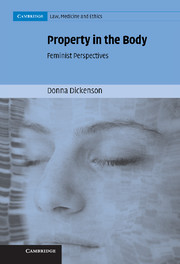Book contents
- Frontmatter
- Contents
- Acknowledgements
- Preface
- 1 Do We All Have ‘Feminised’ Bodies Now?
- 2 Property, Objectification and Commodification
- 3 The Lady Vanishes: What's Missing from the Stem Cell Debate
- 4 Umbilical Cord Blood Banks: Seizing Surplus Value
- 5 The Gender Politics of Genetic Patenting
- 6 Biobanks: Consent, Commercialisation and Charitable Trusts
- 7 The New French Resistance: Commodification Rejected?
- 8 Tonga, the Genetic Commons and No Man's Land
- 9 Afterword
- Bibliography
- Index
1 - Do We All Have ‘Feminised’ Bodies Now?
Published online by Cambridge University Press: 15 December 2009
- Frontmatter
- Contents
- Acknowledgements
- Preface
- 1 Do We All Have ‘Feminised’ Bodies Now?
- 2 Property, Objectification and Commodification
- 3 The Lady Vanishes: What's Missing from the Stem Cell Debate
- 4 Umbilical Cord Blood Banks: Seizing Surplus Value
- 5 The Gender Politics of Genetic Patenting
- 6 Biobanks: Consent, Commercialisation and Charitable Trusts
- 7 The New French Resistance: Commodification Rejected?
- 8 Tonga, the Genetic Commons and No Man's Land
- 9 Afterword
- Bibliography
- Index
Summary
It is widely feared that we no longer possess a property in our own bodies. Instead, it has been argued, ‘what we are witnessing is nothing less than a new gold rush, and the territory is the human body’. Tangible rights in human tissue and intangible rights in the human genome have been said to be the subject of a new enclosure movement by researchers, biotechnology corporations and governments. Commodification of the body, broadly construed to include private property rights by third parties in tissue, DNA samples, umbilical cord blood and other substances derived from individuals' bodies, has caused great, if sometimes belated, outrage among patients' rights organisations, academic commentators, journalists and the general public, in both the developing and the developed worlds.
An eBay auction for a healthy human kidney attracted global bids up to US$5.75 billion. The leg bones of the late broadcaster Alistair Cooke were stolen by a criminal ring as his body lay in a New York funeral home, and subsequently sold, like those of an estimated 1,800 others, for processing into dental implants. Advertisements regularly circulate in US college newspapers, offering egg ‘donors’ amounts varying between US$5,000–$50,000, depending on ‘desirability’: blond, tall, athletic and musical donors command the higher prices, at considerable risk to themselves. One report documented the taking of seventy eggs at one time from a ‘donor’ who nearly died in the process; another, the international trade for beauty treatments of fetuses from Ukrainian women paid £100 to have an abortion.
- Type
- Chapter
- Information
- Property in the BodyFeminist Perspectives, pp. 1 - 25Publisher: Cambridge University PressPrint publication year: 2007

